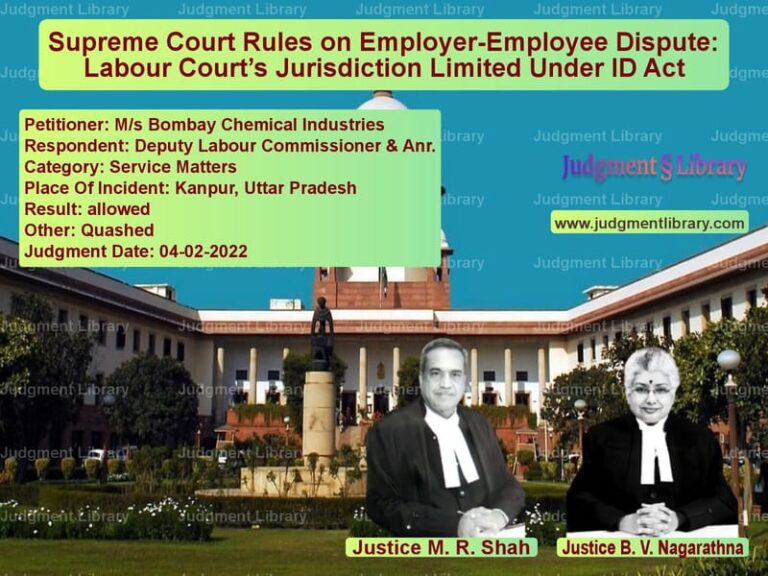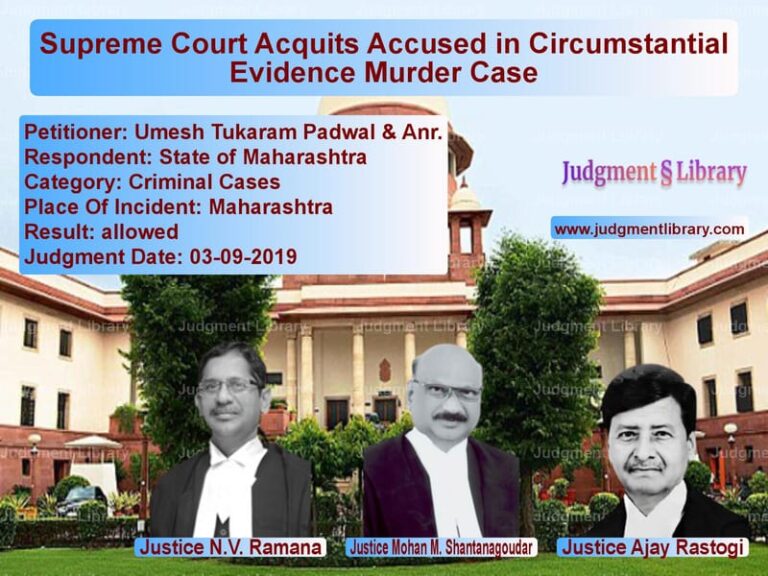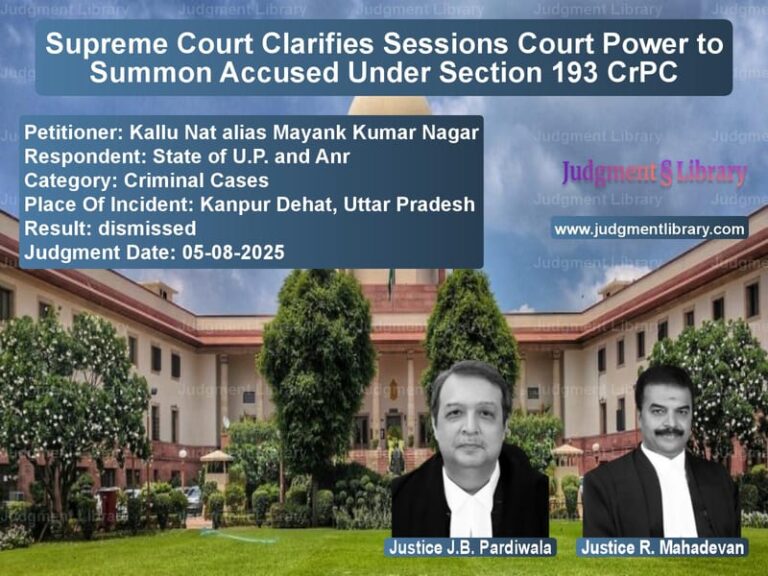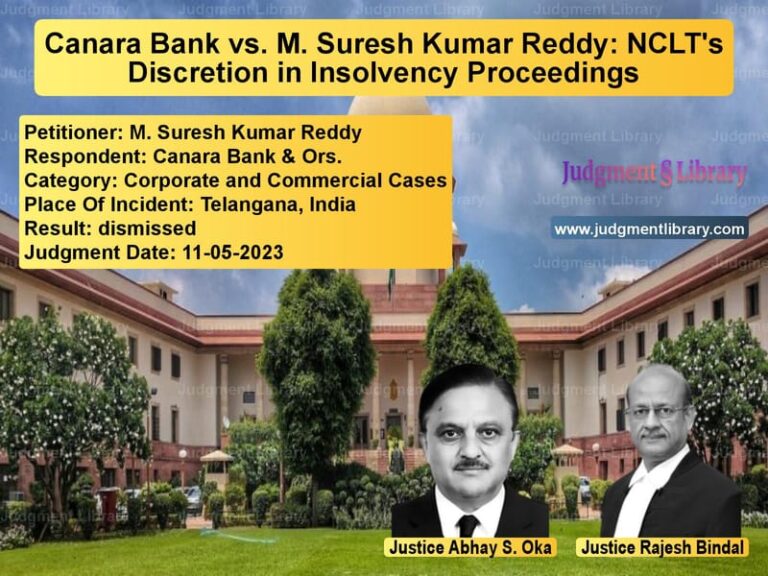Har Naraini Devi & Anr. v. Union of India: Inheritance Rights Under the Delhi Land Reforms Act
The case of Har Naraini Devi & Anr. versus the Union of India revolves around the interpretation of Section 50(a) of the Delhi Land Reforms Act, 1954, concerning the inheritance rights of the appellants in agricultural property. The appellants, Har Naraini Devi and her daughter, challenged the provisions of Section 50(a), asserting that it violated their fundamental rights under Articles 14, 15, 254, and 21 of the Constitution of India. The dispute arises from the succession to agricultural land following the death of Ishwar Singh, whose inheritance was claimed by his sons and grandsons.
The appellants, the widow and daughter of Ishwar Singh, sought to challenge the legal framework under which the property had passed to the grandsons of Ishwar Singh under the Delhi Land Reforms Act. The appellants argued that Section 50(a) of the Act discriminates against women and violates their right to equal succession in agricultural land. They contended that the provisions of the Hindu Succession Act, 1956, should prevail over the 1954 Act, as it offers more equitable rights to female heirs, and that the amendments to the 1956 Act, which were made to address gender bias in inheritance laws, should apply retroactively.
The crux of the appellants’ argument was based on the assertion that the succession laws under the 1954 Act were outdated and discriminatory. They claimed that the Delhi Land Reforms Act’s provision on succession should be struck down for being unconstitutional, as it violated the principle of equality before the law as enshrined in the Constitution of India. They argued that in light of the amendments to the Hindu Succession Act in 2005, women should have equal rights to inherit agricultural property, and the 1954 Act’s provision that restricted women’s rights should not hold in modern India.
The respondents, represented by the Union of India, opposed the appellants’ claims. They argued that the Delhi Land Reforms Act had been in place for many years and had been recognized as constitutional under Article 31B of the Constitution of India. The Act had been included in the Ninth Schedule, and its provisions were protected from judicial review based on the constitutional doctrine of immunity. They also emphasized that the law related to agricultural land succession was a special law, and the 1954 Act was intended to regulate the land tenure system for agricultural landholders, which had its unique set of rules separate from the general laws regarding inheritance.
In its judgment, the Division Bench of the Delhi High Court dismissed the writ petition filed by the appellants, ruling that the provisions of the Delhi Land Reforms Act, specifically Section 50(a), were valid. The Court relied on the fact that the Act had been placed in the Ninth Schedule of the Constitution, granting it immunity from challenges on the ground of being unconstitutional. The High Court also noted that prior to the decision in Kesavananda Bharati v. State of Kerala, laws included in the Ninth Schedule had been provided immunity from judicial review, and the provisions of the 1954 Act fell within this protection. The appellants’ challenge to the law’s constitutionality was therefore rejected, and their petition was dismissed.
The appellants, dissatisfied with the High Court’s decision, appealed to the Supreme Court of India. The Supreme Court was tasked with determining whether Section 50(a) of the Delhi Land Reforms Act, 1954, was unconstitutional and whether the rights of women in agricultural succession were violated under the Act. The Court considered the legal arguments raised by both sides, including the constitutional validity of the provisions and their compatibility with the Hindu Succession Act, 1956.
The Supreme Court, in its judgment, reviewed the arguments presented by both the appellants and the respondents. The appellants had argued that the 1954 Act was in conflict with the provisions of the Hindu Succession Act, 1956, particularly following the amendment to Section 6 of the 1956 Act in 2005, which granted equal inheritance rights to women. They also contended that the 1954 Act’s provisions were discriminatory and violated their rights under Articles 14 and 15 of the Constitution, which guarantee equality before the law and prohibit discrimination on the grounds of sex.
Read also: https://judgmentlibrary.com/state-of-karnataka-vs-m-a-mohamad-sanaulla-a-land-dispute-case/
The respondents, on the other hand, argued that the provisions of the 1954 Act were immune from judicial review due to their inclusion in the Ninth Schedule, which had been upheld by the Court in earlier decisions. They contended that the provisions of the 1954 Act were in line with the legislative intent of regulating agricultural land tenure and were not discriminatory in nature. They emphasized that the law applied uniformly to all landholders and was part of a broader system designed to manage agricultural land holdings, which was a matter of state jurisdiction.
The Supreme Court considered the constitutional issues involved, particularly focusing on the immunity granted to laws included in the Ninth Schedule. The Court noted that laws in the Ninth Schedule had been protected from judicial review, but it also emphasized that this immunity did not extend to laws that violated the fundamental rights guaranteed by the Constitution. The Court concluded that the provisions of the Delhi Land Reforms Act, particularly Section 50(a), could not be challenged on the grounds of unconstitutionality due to their inclusion in the Ninth Schedule.
In terms of gender equality, the Supreme Court acknowledged the amendments made to the Hindu Succession Act in 2005, which granted women equal rights to inherit property. However, the Court held that the provisions of the Delhi Land Reforms Act, which governed succession to agricultural land, were distinct from the provisions of the Hindu Succession Act and were intended to regulate land tenure in a manner consistent with agricultural policies. The Court found that the Act was a special law designed to address agricultural land succession and did not violate the fundamental rights of women under Articles 14 and 15 of the Constitution.
The Supreme Court ultimately dismissed the appeal, affirming the High Court’s judgment and holding that the provisions of Section 50(a) of the Delhi Land Reforms Act, 1954, were constitutional. The Court ruled that the law provided a framework for succession to agricultural land and was not discriminatory based on gender. The decision underscored the importance of considering the context and intent of special laws, particularly in the domain of land reforms, while also recognizing the constitutional protections for women’s rights.
This case highlights the complexities involved in interpreting laws related to inheritance and succession, particularly when they intersect with issues of gender equality and land tenure policies. It reinforces the principle that laws included in the Ninth Schedule of the Constitution are protected from judicial review, but also reaffirms that fundamental rights, particularly those related to gender equality, must be upheld. The case is significant in understanding the balance between special legislation and constitutional protections in the context of agricultural land reforms.
Petitioner Name: Har Naraini Devi & Anr..Respondent Name: Union of India & Ors..Judgment By: Justice Vikram Nath, Justice Hemant Gupta.Place Of Incident: Delhi.Judgment Date: 20-09-2022.
Don’t miss out on the full details! Download the complete judgment in PDF format below and gain valuable insights instantly!
Download Judgment: har-naraini-devi-&-a-vs-union-of-india-&-ors-supreme-court-of-india-judgment-dated-20-09-2022.pdf
Directly Download Judgment: Directly download this Judgment
See all petitions in Contract Disputes
See all petitions in Property Disputes
See all petitions in Succession and Wills
See all petitions in Damages and Compensation
See all petitions in Judgment by Vikram Nath
See all petitions in Judgment by Hemant Gupta
See all petitions in dismissed
See all petitions in supreme court of India judgments September 2022
See all petitions in 2022 judgments
See all posts in Civil Cases Category
See all allowed petitions in Civil Cases Category
See all Dismissed petitions in Civil Cases Category
See all partially allowed petitions in Civil Cases Category







